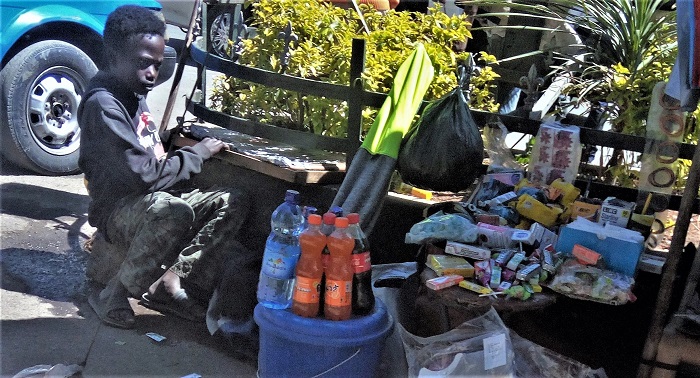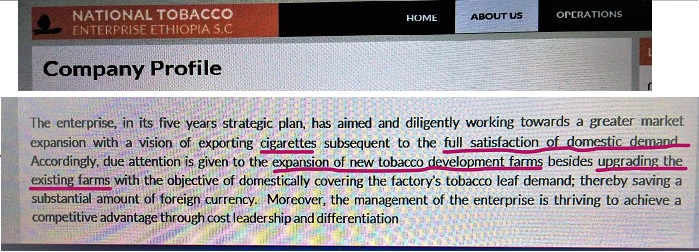
After reading this article, please consider clicking on the link below, sign the following petition, and share it as widely across the internet as you can to give a voice to Ethiopians whose government-owned tobacco company recently made a $510 million deal with Japan Tobacco International, with the aim of expanding tobacco farms and increasing cigarette production in Ethiopia:
Stop expansion of tobacco farms and increased cigarette production and smokers in Ethiopia!
The planned increase in cigarette production will increase smoking rates in Ethiopia, not the least because Ethiopia’s most commonly smoked brand of cigarette (Nyala) is marketed only to the domestic market, that is to Ethiopians.
Ethiopia’s tobacco company, Ethiopia’s government and Japan Tobacco International are thrilled with the deal; Ethiopians are the victims.
In mid-2016, the Ethiopian government broke WHO FCTC tobacco treaty laws (Article 5.3) by selling 40% of shares of the Ethiopian government-owned tobacco company, National Tobacco Enterprise (NTE), to Japan Tobacco International (JTI), an international tobacco company that prides itself in its investment in “emerging markets,” a euphemism the company uses to include “developing countries.”
You can read on the web sites below (bottom of page) about this unethical and unhealthy deal, and see how officials from Japan Tobacco International, National Tobacco Enterprise and even Ethiopian government ministers attended and were excited and thrilled by this $510 million deal. Here are a few quotes:
“Ethiopia will be an important expansion of our geographic footprint in emerging markets.” (Mutsuo Iwai, Executive Vice President of Japan Tobacco International).
“We will work with all shareholders to see how we can continue to grow the NTE business and explore opportunities to further strengthen NTE’s brands such as Nyala, as well as the overall distribution and manufacturing capabilities.” (Jorge da Motta, JTI’s Regional President for the Middle East, Near East and Africa region.) Note that Nyala cigarettes are sold exclusively to the domestic market, namely Ethiopians, and are by far the most smoked brand in Ethiopia.
“We very much look forward to working with JTI and offer our full support in making this a success for all stakeholders.” (Demitu Hambisa, Ethiopia’s Minister of Public Enterprises.) The missing and neglected “stakeholders” were, of course, Ethiopia’s smokers and the youth who will become smokers. By the way, Demitu Hambisa subsequently became, ironically, Minister for Women and Children!
Incidentally, this was the biggest deal in Ethiopia’s history between a foreign company and an Ethiopian government industry. What a pity it wasn’t a deal with a more healthy and useful industry for one of the poorest countries on Earth!
As a professor, I taught medical students at Addis Ababa University for four years and gave a 10-hour course I created on tobacco issues. Some of these wonderful students were highly inspired and got together to make their campus “smoke-free” by holding a “No Tobacco Day.” When they found out about the JTI-NTE $510 million deal, many of them were disappointed and puzzled with their government’s actions but were afraid to speak out.
National Tobacco Enterprise (NTE), Ethiopia’s government-owned monopoly, states on its website that its “Vision” is: “To be a cigarettes exporter subsequent to the full satisfaction of the national demand.” Generally speaking, the only people who “demand” cigarettes are those who are addicted to them!
Here’s some information I took from the Ethiopian government’s tobacco (NTE) company’s web site:
https://ethiotobacco.com/en/about-us/company-profile [accessed May 2017]:

NTE states proudly that it is “diligently working towards a greater market expansion with a vision of exporting cigarettes subsequent to the full satisfaction of domestic demand.” It surely means that, after it has addicted as many Ethiopians as possible, it will then export its cigarettes abroad!
The NTE web site goes on: “Accordingly, due attention is given to the expansion of new tobacco development farms besides upgrading the existing farms with the objective of domestically covering the factory’s tobacco leaf demand.”
Ethiopia does not need expansion of tobacco farms: it needs farms with healthy agriculture to feed its people, many of whom are undernourished or facing famine!

Photo: I took this photo (January, 2017) in Addis Ababa, Ethiopia, of a child selling cigarettes and chewing gum for her mother. The child told me she was just six years old.
On the one hand, some of tobacco control laws detailed in the WHO FCTC tobacco treaty, which Ethiopia ratified in 2014, have been implemented. For example, smoking in public buildings has been banned and implemented in some big cities. Health warning signs have appeared on the front of the cigarette packs of the major brands of cigarette there, though these meet the bare minimum of covering 30% of the area of the pack.
Other laws in the WHO FCTC treaty are just not being enforced. These include banning the sale of single cigarettes, and sales of cigarettes to, and by, children under 18. You see children selling cigarettes on the streets all over Addis Ababa, for example, and you see children under 18 buying cigarettes. And most street vendors and stores that sell cigarettes sell them as single cigarettes. Taxation on Ethiopian cigarettes is also low- among the lowest globally- and does not meet WHO recommendations that would allow significantly reduced smoking rates.
It seems that the “left hand” of the government does not know what the “right hand” is doing. While WHO FCTC laws were made official, and a handful enforced, the government was, at the same time, negotiating the $510 million deal with Japan Tobacco International, aomed at increasing smoking rates and expanding tobacco farms!
Child labour, cancers, lung disease, heart disease, tuberculosis, HIV, childhood asthma and pneumonia- these are just a handful of the many harms that this deal will cause
Ethiopians need anything but an increase in cigarette production, an increase in smoking prevalence, and expansion of Ethiopia’s tobacco farms, but that is what this $510 million deal will do. Ethiopia already has a poor record when it comes to child labour and there is a real risk that children will be employed on tobacco farms as these farms expand there.
In effect, the deal promises to cause addiction, disease and death to millions of Ethiopians, who already have enough diseases to contend with, including malnutrition, HIV, tuberculosis, childhood diarrhea, pneumonia, malaria and much more on their plate.
The tobacco deal will not only cause suffering of many Ethiopians through tobacco-related diseases (heart attacks, strokes, cancers, asthma and emphysema), but also may well hinder programmes aimed at tackling tuberculosis and other infectious diseases. It is well known that smoking increases the risk of a person becoming infected with, and dying from, tuberculosis. The same is true for HIV and pneumonias, which are also common in Ethiopia.
What is quite sickening is that this lucrative tobacco deal was made while up to 20 million poor Ethiopians were under the threat of malnutrition, resulting from Ethiopia’s recent devastating drought.
Tobacco-growing land should be used instead for healthy agriculture!

The above image shows an impoverished 12-year old girl selling a single cigarette to a customer. I took the photo outside a government hospital in Addis Ababa in 2016. The sale of cigarettes by minors under 18 years old, as well as the sale of single cigarettes, are both against the law in Ethiopia, but these laws are essentially ignored by the authorities. Indeed, the Ethiopian government recently made a $510 million deal with Japan Tobacco International that will expand tobacco farms and increase cigarette production and smoking rates in Ethiopia.
Ethiopia is in a state-of-emergency, as of October 2016, due to widespread unrest, and poor Ethiopians even at the best of times do not have a voice, but now they need a voice more than ever. They need YOU and ME to give them a voice, to defend them from deals such as the ill-considered tobacco transaction between JTI and the Ethiopian government.
It is also well known that citizens of developing countries that invest in tobacco and smoking do not benefit overall. The costs of healthcare involved in taking care of people with tobacco-related diseases, the costs in loss of labour from chronic tobacco-related diseases and death, and the costs to children who lose a parent to smoking-related disease are high. Malawi and Zimbabwe are good examples: they are two of the poorest countries on Earth and they are in the top ten tobacco growing countries. The people who benefit from tobacco are tobacco company executives and tobacco company shareholders. The big losers are precious children, adults who suffer and die from tobacco-related diseases, many farmers, and child labourers.
So please, sign the petition. Here it is again:
Speak out for the health of Ethiopians who have no voice because of their lack of access to the internet, their oppression, and their lack of access to knowledge about the ills of tobacco use. Thank you.
http://www.jti.com/media/news-releases/jt-acquires-40-ethiopias-nte/
http://afkinsider.com/129796/129796/#sthash.Smq0Gnc4.dpuf

